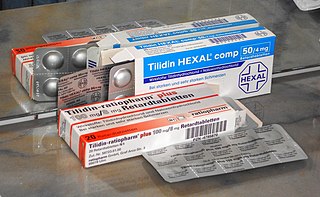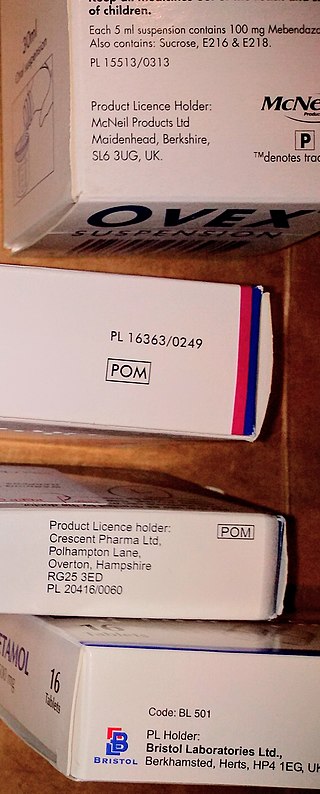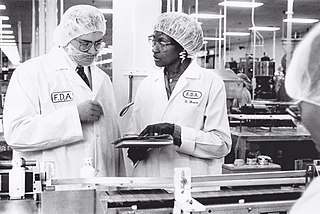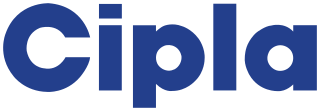Related Research Articles

A medication is a drug used to diagnose, cure, treat, or prevent disease. Drug therapy (pharmacotherapy) is an important part of the medical field and relies on the science of pharmacology for continual advancement and on pharmacy for appropriate management.

A generic drug is a pharmaceutical drug that contains the same chemical substance as a drug that was originally protected by chemical patents. Generic drugs are allowed for sale after the patents on the original drugs expire. Because the active chemical substance is the same, the medical profile of generics is equivalent in performance compared to their performance at the time when they were patented drugs. A generic drug has the same active pharmaceutical ingredient (API) as the original, but it may differ in some characteristics such as the manufacturing process, formulation, excipients, color, taste, and packaging.

A prescription drug is a pharmaceutical drug that is permitted to be dispensed only to those with a medical prescription. In contrast, over-the-counter drugs can be obtained without a prescription. The reason for this difference in substance control is the potential scope of misuse, from drug abuse to practicing medicine without a license and without sufficient education. Different jurisdictions have different definitions of what constitutes a prescription drug.

The pharmaceutical industry is an industry in medicine that discovers, develops, produces, and markets pharmaceutical drugs for use as medications to be administered to patients, with the aim to cure and prevent diseases, or alleviate symptoms. Pharmaceutical companies may deal in generic or brand medications and medical devices. They are subject to a variety of laws and regulations that govern the patenting, testing, safety, efficacy using drug testing and marketing of drugs. The global pharmaceuticals market produced treatments worth $1,228.45 billion in 2020 and showed a compound annual growth rate (CAGR) of 1.8%.

Cipla Limited is an Indian multinational pharmaceutical company, headquartered in Mumbai. Cipla primarily develops medication to treat respiratory disease, cardiovascular disease, arthritis, diabetes, depression, and other medical conditions.

Stavudine (d4T), sold under the brand name Zerit among others, is an antiretroviral medication used to prevent and treat HIV/AIDS. It is generally recommended for use with other antiretrovirals. It may be used for prevention after a needlestick injury or other potential exposure. However, it is not a first-line treatment. It is given by mouth.
Matthias Rath is a doctor, businessman, and vitamin salesman. He earned his medical degree in Germany. Rath claims that a program of nutritional supplements, including formulations that he sells, can treat or cure diabetes, cardiovascular disease, cancer, and HIV/AIDS. These claims are not supported by any reliable medical research. Rath runs the Dr. Rath Health Foundation, has been closely associated with Health Now, Inc., and founded the Dr. Rath Research Institute.

Efavirenz (EFV), sold under the brand names Sustiva among others, is an antiretroviral medication used to treat and prevent HIV/AIDS. It is generally recommended for use with other antiretrovirals. It may be used for prevention after a needlestick injury or other potential exposure. It is sold both by itself and in combination as efavirenz/emtricitabine/tenofovir. It is taken by mouth.

James Packard Love is the director of Knowledge Ecology International, formerly known as the Consumer Project on Technology, a non-governmental organization with offices in Washington, D.C., and Geneva, that works mainly on matters concerning knowledge management and governance, including intellectual property policy and practice and innovation policy, particularly as they relate to health care and access to knowledge.

The first AIDS case identified in Brazil was in 1982. Infection rates climbed exponentially throughout the 1980s, and in 1990 the World Bank famously predicted 1,200,000 cases by 2000, approximately double the actual number that was later reported by the Brazilian Ministry of Health and most international organizations. South and Southeast have 75% or more of this infection. The Northeast has 33% of the population but only 10% of AIDS.
Virodene was claimed to be an HIV/AIDS drug developed in South Africa, but was rejected by the scientific community. Controversy surrounded the research procedures, political interference and the safety and efficacy of the drug itself, the main active ingredient of which is the highly toxic industrial solvent dimethylformamide.
Some authors advocating patent reform have proposed the use of prizes as an alternative to patents. Critics of the current patent system, such as Joseph E. Stiglitz, say that patents fail to provide incentives for innovations which are not commercially marketable. Stiglitz provides the idea of prizes instead of patents to be awarded in order to further advance solutions to global problems such as AIDS.

The South African AIDS Vaccine Initiative (SAAVI) was a South African organisation with the mission of coordinating the research and development of HIV vaccines in and for South Africa. The organization closed on 31 December 2012.
The Food and Drug Administration is a federal agency of the United States, formed in 1930.
The cost of HIV treatment is a complicated issue with an extremely wide range of costs due to varying factors such as the type of antiretroviral therapy and the country in which the treatment is administered. The first line therapy of HIV, or the initial antiretroviral drug regimen for an HIV-infected patient, is generally cheaper than subsequent second-line or third-line therapies. There is also a great variability of drug prices among low, middle, and high income countries. In general, low-income countries have the lowest cost of antiretroviral therapy, while middle- and high-income tend to have considerably higher costs. Certain prices of HIV drugs may be high and difficult to afford due to patent barriers on antiretroviral drugs and slow regulatory approval for drugs, which may lead to indirect consequences such as greater HIV drug resistance and an increased number of opportunistic infections. Government and activist movements have taken efforts to limit the price of HIV drugs.

Aspen Pharmacare Holdings Limited is a public multinational pharmaceutical company headquartered in uMhlanga, South Africa. Founded in 1997, it listed on the Johannesburg Stock Exchange (JSE) in 1998, and purchased South African Druggists in 1999 before expanding into international markets. Currently the largest pharmaceutical company in Africa through aggressive mergers and expansion, with major manufacturing sites in locations such as Gqeberha in South Africa, Bad Oldesloe in Germany, Notre-Dame-de-Bondeville in France, and Oss, Netherlands, Aspen is known for manufacturing and distributing branded pharmaceuticals as well as generic HIV/AIDS antiretrovirals (ARVs) and cancer medications. Among other products, Aspen has also been involved in manufacturing the Janssen COVID-19 vaccine through "fill and finish", and has the rights to sell the product under its own brand name Aspenovax. The company's revenue in 2022 was R38.6 billion. In 2016 Aspen was fined for high prices on cancer drugs, and after an investigation Aspen committed to reduce prices for 5 years in the European Union.
The Medicines Patent Pool (MPP) is a Unitaid-backed international organisation founded in July 2010, based in Geneva, Switzerland. Its public health driven business model aims to lower the prices of HIV, tuberculosis and hepatitis C medicines and facilitate the development of better-adapted HIV treatments through voluntary licensing and patent pooling. Its goal is to improve access to affordable and appropriate HIV, hepatitis C and tuberculosis medicines in low- and middle-income countries (LMIC). In May 2020, the MPP become an implementing partner of the WHO's Covid-19 Technology Access Pool (C-TAP).
Access to medicines refers to the reasonable ability for people to get needed medicines required to achieve health. Such access is deemed to be part of the right to health as supported by international law since 1946.
BMJ USA: Primary Care Medicine for the American Physician was a monthly peer-reviewed medical journal published by the BMJ Group as a sister journal to the BMJ. It was intended to publish material specifically relevant to readers in the United States. It was established in 2001 and was discontinued permanently in 2005.
At its essence, intellectual property rights are described as “a legal framework for contractual agreements concerning technologies, which encourage the institution of ‘markets for technology’, making easier the international transfer of technology and its diffusion at the local level.” The discussion that has taken place, concerning intellectual property rights and the following agreements, centers around spreading global knowledge and technologies. Intellectual property has been largely discussed and gone through a series of changes. At the globalized level, a global network for ideas led institutions to put policies in place and key players to form opposing viewpoints. Beyond intellectual property, alternative sources for innovation include forming partnerships and moving business activities abroad.
References
- ↑ "MEDICINES AND RELATED SUBSTANCES CONTROL ACT 101 OF 1965" (PDF). Archived from the original (PDF) on 2012-01-05. Retrieved 2012-07-15., Medicines and Related Substances Control Amendment Act of 1997
- 1 2 Duane Nash, “South Africa's Medicines and Related Substances Control Amendment Act of 1997,” Berkeley Technology Law Journal 15 (2002): 485-504
- ↑ Sidley, Pat (24 February 2001). "Drug companies sue South African government over generics". BMJ: British Medical Journal. 322 (7284): 447. doi:10.1136/bmj.322.7284.447. ISSN 0959-8138. PMC 1119675 . PMID 11222409.
- 1 2 3 4 5 't Hoen, Ellen (2002). "TRIPS, pharmaceutical patents, and access to essential medicines: a long way from Seattle to Doha". Chicago Journal of International Law. 3 (1): 27–46. ISSN 1529-0816. PMID 15709298.
- ↑ Mayne, Ruth (1 February 2001). "South Africa vs. the Drug Giants: A challenge to affordable medicines". Oxfam - Policy & Practice. Retrieved 24 May 2018.
- ↑ Sidley, Pat (28 April 2001). "Drug companies withdraw law suit against South Africa". BMJ: British Medical Journal. 322 (7293): 1011. doi:10.1136/bmj.322.7293.1011. ISSN 0959-8138. PMC 1120171 . PMID 11325753.